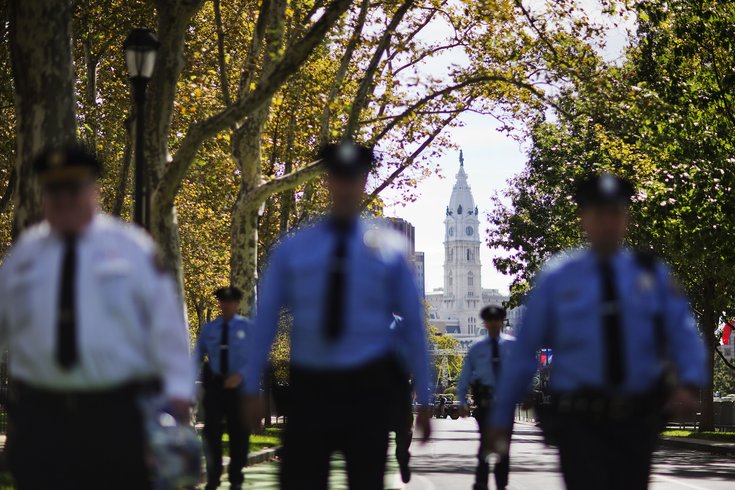
February 24, 2016
 David Goldman/AP
David Goldman/AP
In this file photo, City Hall stands in the background as police walk along Benjamin Franklin Parkway, Friday, Sept. 25, 2015, in Philadelphia.
The ACLU of Pennsylvania is planning to appeal Friday's decision from a federal court which ruled a person has no First Amendment right to record police activity without a specific, critical reason for doing so.
The decision from Judge Mark A. Kearney of the U.S. District Court for the Eastern District of Pennsylvania ruled that without such a stated purpose challenging police activity, the First Amendment does not apply to filming or photographing on-duty police officers.
Mary Catherine Roper is deputy legal director for the ACLU of Pennsylvania and is representing the plaintiffs in the case, who both claim police retaliated against them for exercising their First Amendment Right during separate incidents in Philadelphia.
Interviewed Wednesday, Roper said the First Amendment protected the right to record police, no matter what someone intends to do with the recording.
"In this day and age, frankly, the ability to record police is such an important part of our move to ensure that our police are accountable," Roper said.
Thursday morning the ACLU-PA released a statement from its Executive Director Reggie Shuford about the "copwatch ruling," calling civilian video recordings of police "essential" to holding officers accountable for their actions. Shuford said.
"The freedom to monitor the police without fearing arrest or retaliation is one of the ways we distinguish a free society from a police state. Every court that has addressed this issue has ruled that the right to record the police performing their duties in public is at the core of what the First Amendment protects. Judge Kearney’s ruling is an outlier, and we intend to appeal it.”
A tweet from the ACLU-PA's account was more direct:
Despite judge's ruling, it's still LEGAL to record police
— ACLU of Pennsylvania (@aclupa) February 25, 2016
Our statement: https://t.co/VoQo1uNfRN #Copwatch pic.twitter.com/KHyI8aGuQg
Roper made note of a 2011 memo from former Philadelphia Police Commissioner Charles Ramsey that said officers should expect the general public to record their activity.
The memo states officers shall not interfere with the public's right to do so or damage or confiscate devices used to record police activity, with the exception of an officer having probable cause to believe the video or photo contains evidence of a crime and is at risk of being destroyed.
A spokesperson for the Philadelphia Police Department said Wednesday that policy was still in effect. However, the department did not immediately respond to a question as to whether the officers involved in the lawsuit had been disciplined in any way for allegedly violating the policy.
The lawsuit filed against the city is a joint case concerning two incidents in Philadelphia that occurred after that policy was enacted in 2011.
In 2012, Amanda Geraci, a self-described "legal observer," was filming an environmental protest in the city. When she moved close to an officer arresting a protester, she said she was physically restrained by an officer and prevented from recording the arrest.
A year later, Richard Fields, then an undergraduate at Temple University, was recording about 20 police officers outside a house party on campus.
Fields refused to leave when asked by officers, who subsequently detained and handcuffed him, taking away his cell phone and putting him in the back of a police van. His reason for filming was that he "just thought that would make a great picture "
Judge Kearny ruled Friday that Geraci's claim of excessive force and Fields' claims of false arrest and unreasonable search can proceed to trial.
Kearney's decision does not address the argument of the officers – who claimed qualified immunity – or the city – which claimed a lack of supervisory liability – regarding the accusations.
Instead, he cited language from a 1984 U.S. Supreme Court ruling that concluded, "it is the obligation of the person desiring to engage in assertedly expressive conduct to demonstrate that the First Amendment even applies."
“We decline to create a new First Amendment right for citizens to photograph officers when they have no expressive purpose such as challenging police actions,” Kearney's decision said.
Roper said that while some U.S. Court of Appeals Circuits have made contradictory rulings to Kearney's, the Third Circuit Appeals Court – which would preside over the ACLU's appeal – has not made a previous decision on filming police in regard to First Amendment rights.
She did, however, express confidence in the ACLU's decision to fight Kearney's ruling.
"It's really hard to imagine a ruling in which this is not protected by the First Amendment," Roper said.
Assistant City Solicitor John Coyle, who is representing the city in the case, could not immediately be reached for comment late Wednesday afternoon.